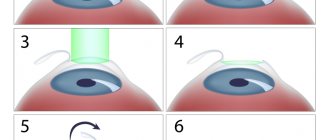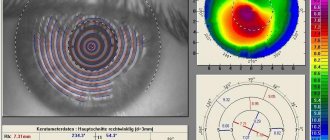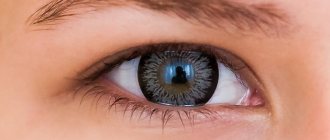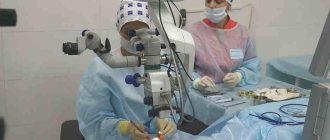Recently, vision diseases have become significantly younger and this is due to the development of technology. There are many ways to correct vision, but, according to doctors, laser correction is the best way to get rid of vision defects.
Excimer laser correction is one of the most common methods of vision treatment and today this method is considered the safest and most popular among patients. Laser correction is prescribed for many diseases: myopia, astigmatism, farsightedness. Correction should be carried out when vision impairment does not progress. Sometimes such an operation should be abandoned: we are talking about severe stages of these diseases.
A little about the history of the method
For the first time, a microkeratome, a special automated knife that allows one to form a flap from the cornea, was used back in 1960. At the same time, the current Lasik operation was called keratomileusis. In the 80s of the last century, it was found that the excimer laser with ultraviolet radiation, due to its low temperature, is excellent for performing gentle operations on the cornea, without damaging the tissue. This allows you to completely safely change the properties of the optics of the cornea. The final formation of the methodology occurred by 1991.
Technologies are constantly evolving, and today more advanced, accurate and fast lasers are already used for vision correction, very different from those that were used during the development of laser corrective operations.
How is the operation performed?
Laser surgery takes no more than 15 minutes. First of all, the patient is given anesthesia, then the doctor uses a laser to change the irregular shape of the cornea of the eye.
When working with a laser, eye drops are applied to the patient's eyes to reduce pain on the visual organs. Using a keratome (small scalpel), the doctor cuts a piece of the cornea and lifts it up. After these steps, the laser seamlessly processes the damaged cornea, giving it the desired shape. Then the doctor returns the incised piece of the cornea and puts it in place: the operation is over.
This correction method is effective because after the operation the patient can almost immediately begin normal life. Another advantage of laser correction is the large variability of age restrictions: the operation can be performed on all patients aged 18 to 45 years. According to doctors, within 24 hours after the operation the patient can return to working at the computer, but in the first few days they recommend limiting the strain on the visual organs.
Operation technique
The essence of the LASIK operation is “resurfacing,” or rather changing the shape of the cornea through strictly dosed, computer-controlled evaporation of corneal tissue using an ultraviolet beam (excimer) laser.
The entire procedure takes approximately 10-12 minutes for both eyes. Using a microkeratome, the surgeon separates a corneal flap of a given thickness and diameter. To do this, a fixing special vacuum ring is first applied to the eye. A protective valve is formed in the cornea with a keratome (up to a thickness of 100-180 microns with an average thickness of the center of the cornea of 500-550 microns). Connected at one edge to the cornea, the flap is carefully lifted and folded back. The lens is then formed using an excimer laser. At the end of which, the corneal flap is placed in place. Since in a matter of minutes it sticks to the surface in the affected area, stitches are usually not applied. Thanks to the valve, the correct architecture of the corneal layers is completely preserved and vision is restored within a matter of hours after the correction procedure. After their expiration, the patient receives the highest possible visual acuity and complete comfort.
Sometimes, instead of a mechanical microkeratome, a femtosecond laser can be used, which allows you to make a more precise, accurate cut that forms a flap of the required diameter and thickness. Thus, LASIK surgery is possible in two versions - a combination of laser and mechanical effects or completely laser.
Preparing for surgery
Before the operation, the patient must undergo the necessary examination by an ophthalmologist. It is during diagnosis that the patient is given indications/contraindications for excimer laser correction.
Before surgery, patients are not recommended to wear contact lenses for 2 days before surgery, and it is also strictly not recommended to use eau de toilette with a strong smell on the day of surgery. Since you cannot wash your hair after surgery, doctors advise performing the necessary hygiene procedures before surgery.
After diagnosis and preparation for surgery, the doctor informs the patient about the possible results after surgery, which will allow the patient to avoid expected complications.
Vision correction using the Super LASIK method
Super Lasik is a vision correction technique taking into account high-order aberrations (distortions), which allows you to achieve ideal or close to ideal optics, as well as obtain high vision, which is often more than 1.0 (1.2 - 1. 5 and even higher).
The cornea of the eye, the source of wave aberrations, remains virtually unchanged throughout human life. Taking this fact as a basis, specialists from the German company SCHWIND developed and created a complex of high-tech hardware software, and also developed a technique called SUPERLASIK.
EYE REFRACTION DISORDERS
These disorders include myopia, farsightedness, and astigmatism, which reduce vision.
So, with myopia, a person sees poorly in the distance, but better near. With farsightedness, especially after the age of 40, vision is reduced both at distance and near. But with a high degree of astigmatism, it is difficult to see, and the visual load is difficult to bear. Of course, refractive errors come from childhood, and sometimes pediatric eye doctors do a lot to preserve the vision of a child wearing glasses. But the child has grown up and is 19-20 years old. It's time to think about how to correct refractive errors? The points are known. This is a good and harmless prosthesis - but still a prosthesis, and it is not comfortable, and the glasses sweat in the cold, and the bridge of the nose is pressed, and all the “beauty” is spoiled. Soft contact lenses? Yes, this is also a way out, and these small transparent prostheses are not even visible from the outside. But imagine, you entered a smoky room, or a room where chemical reagents were sprayed in the air. Contact lenses will be the first to “respond” - they will absorb everything and “feed” your cornea. We are not talking about infectious complications of contact lenses or dry eye syndrome. In the last decade, convincing evidence has been obtained that under contact lenses, a person’s eye ages much faster than the person himself. But you can also change your own cornea. It can simply be adjusted or figuratively changed according to the eye of a particular person. And, if you do this, vision will appear without glasses and contact lenses. Just 10 years ago, in many cases we shrugged our shoulders and could not correct complex refractive errors, but now almost everything can be corrected. Laser technologies make it possible to change the human cornea with micron accuracy. Today in the world the number of people operated on with LASIK amounts to tens of millions. Clinical observations last for 25 years, and the results last for life. At the same time, the mechanical strength of the cornea remains normal and is not similar to the condition of the eye after keratotomy, which was previously used very widely in our country. There are no additional physical restrictions, you can engage in professional sports, and an eye injury will not lead to more severe consequences. By the way, with a keratotomy with a remaining “minus” or an emerging “plus”, you can also improve the result with the help of laser surgery. Such operations are even performed on human corneas transplanted to improve vision. And even if you were given an artificial lens and your refraction was slightly off, it can also be corrected so you don’t have to use glasses. What can serve as a basis for laser surgery? Of course, first of all, this is the presence of refractive errors, then the desire to improve the “quality of visual life,” and also the requirements of some professions and the impossibility of correction with glasses or the insufficient result of such correction. It is better to carry out such a correction at an active working age of 20-35 years. But there is a whole category of people whose vision problems only get worse after 40 years. We are talking about a combination of farsightedness and age-related changes in vision. This is where it’s hard to see in the distance and hard to see up close! In this case, laser correction restores distance vision, and also reduces the strength of glasses for near vision. With myopia of more than 3.5 diopters, a person, even with the onset of age-related changes in vision, will never be able to do without two pairs of glasses. Laser correction will help you get rid of just glasses. At the turn of the 21st century, research and development by leading companies in Russia, Japan, the USA, France, and Germany led to the creation of laser vision correction methods. The problem of poor vision, which has plagued humanity for many centuries, has received its optimal solution. With the help of an excimer laser, the tissue of the cornea of the eye is microevaporated by a given number of microns in its central zone without increasing the temperature of the tissue, under strict computer control. This changes the refractive power of the cornea and restores clear vision. A unique combination of the latest world technologies, the best achievements of domestic ophthalmology and the high skill of doctors allows us to diagnose and correct anomalies of the optical system of the eye at the level of world standards. And today our doctors have made laser vision correction available to residents of Penza. We can quickly and effectively eliminate refractive errors such as any degree of myopia, farsightedness up to 8.0 diopters, and astigmatism of any degree. The excimer laser vision correction technique has existed for more than 20 years, and its distinctive features are not only the accurate and effective correction of the above-mentioned optical defects, but also a short recovery period, predictability and stability of results.
Do you want to get rid of glasses forever and see the world as it is? If yes, then laser vision correction would be the ideal solution. What is important to know about laser vision correction?
- It's comfortable. You can get rid of glasses and contact lenses that may be uncomfortable or harmful to you.
- It's not scary and safe. The modern, popular method of laser vision correction in the world - LASIK - is low-traumatic and within 2 hours after the operation you will be able to go home and see the world with completely different eyes. The operation is painless under local anesthesia; discomfort during and after the operation is minimal.
- It's effective. In the vast majority of cases, vision after laser correction reaches 100%, and sometimes even higher!!!
- It's simple. Laser correction does not disrupt your usual lifestyle. You do not need to take vacation or sick leave to carry it out. If you follow your doctor’s recommendations, you will be able to work at a computer, drive a car, and play sports (light physical activity) the very next day after surgery. This is the only method of vision correction available to people experiencing heavy physical activity (they can be started after 3-4 weeks).
- It's fast. Thanks to the professionalism of our surgeons, the operation lasts 5 minutes, and you can perform it after a complete computer diagnostic of the organ of vision, which in our Center will take no more than an hour.
- It's stable. The results of laser correction do not change over the years in the absence of other eye diseases.
- It's predictable. After diagnosis, the doctor will be able to predict the postoperative result by creating a computer version of your operation and answer all your questions.
Accurate diagnosis is the key to accurate and safe laser vision correction
The laser correction procedure takes only a few minutes, and excellent results are achieved already at the diagnostic stage. This process is long and painstaking, but in our clinic all conditions have been created for a comprehensive examination of the visual system, including highly qualified medical staff and special equipment. The Lasik technique allows for correction using four different programs, including the standard method, personalized, gentle, and aspherical methods.
The capabilities of the laser have significantly expanded the indications for vision correction. Therefore, at the moment laser correction is possible for:
- Myopia – up to – 11.0D;
- Farsightedness – up to + 6.0D;
- Astigmatism – up to – 4.0D.
At the Moscow Eye Clinic you can undergo a full diagnostic examination using the most modern equipment and using the latest methods for diagnosing eye diseases. The clinic treats eye diseases in adults and children over 4 years of age. Our specialists have developed and used effective treatment regimens for vision pathologies. The cost of various diagnostic procedures, as well as treatment, can be found here.
You can find out the cost of a particular procedure or make an appointment at the Moscow Eye Clinic by calling 8 8 (499) 322-36-36 (daily from 9:00 to 21:00) or using the online registration form.
Fomenko Natalia Ivanovna
Patient reviews
Patients do not have a single point of view in their reviews. You can find both positive and negative assessments of patients who have undergone this procedure.
Positive reviews about excimer laser vision correction are based on the fact that:
- pain relief is carried out not under general anesthesia, but in the form of local anesthesia;
- surgery is carried out quickly;
- no need for hospital treatment;
- immediate effect immediately after treatment.
Expert opinion
Slonimsky Mikhail Germanovich
Ophthalmologist of the highest qualification category. Has extensive experience in diagnosing and treating eye diseases in adults and children. More than 20 years of experience.
The excimer laser vision correction procedure is chosen by patients suffering from astigmatism, myopia and farsightedness. The operation has a lifelong effect: you can find positive reviews from patients who had vision correction five, ten and even fifteen years ago.
Negative reviews are associated with complications that arose in patients during the postoperative period.










